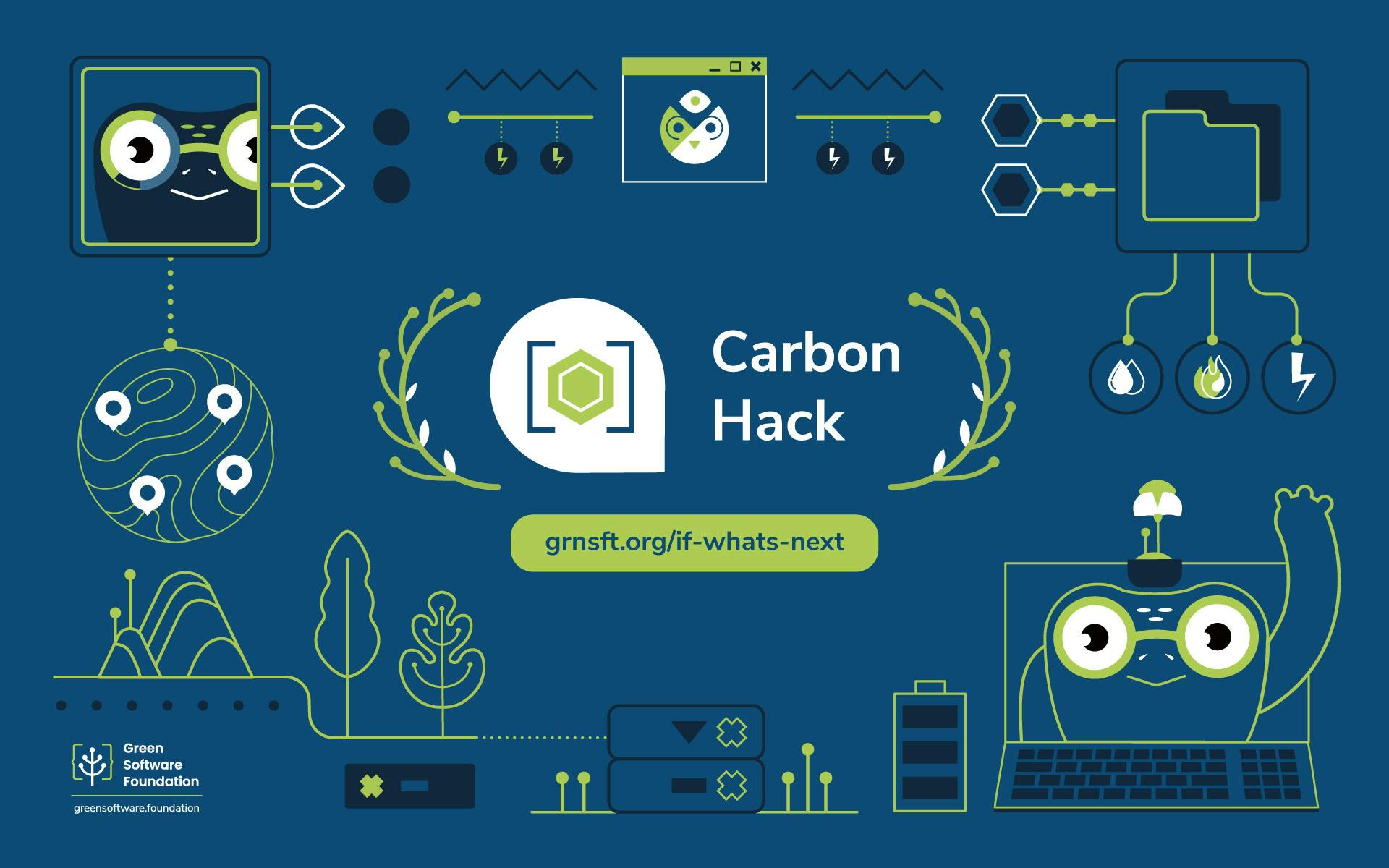Thanks to the generous support from our sponsors—Accenture, Amadeus, AVEVA, BCG X, Sentry Software, IMDA, Nedbank South Africa, and NTT DATA—Carbon Hack 24 brought together over 500 sustainability software developers and future green software practitioners from around the world to accelerate advancements in measuring software for sustainability.
On Earth Day, we highlight the winners of this year’s hackathon, the thought leadership that will take us forward, and how the GSF plans to turn everyone into watchers for greener software–those who choose to observe impacts, verify findings, challenge assumptions, and measure observable metrics!
Celebrating Innovation: Winners and Projects
The hackathon concluded with 47 impressive submissions across six categories, showcasing the Impact Framework's (IF) diverse applications and potential to revolutionize software measurement.
Our judges voted from 15 shortlisted submissions to reveal our winners:
Best Content: C--
Project: Evaluating LLM carbon footprints
Jing Liang (Team Lead), Yuyan Sun, Xiaomin Liang
Affiliated Organization: Thoughtworks
Best Contribution: Green HighTech #Innovators
Project: The Green Mile: Streamlining Impact Framework Accessibility
Wilco Burggraaf (Team Lead), Kees Zijjlmans, Teun van Zon, Thom Van Heeswijk
Affiliated Organization: Hightech ICT
Beyond Carbon: Opencast Carbon 24
Project: Environmental Impact Risk Scorecard
Adam Coles (Team Lead), Yohan Jayarathna, Omotayo Talabi, Andrew Murray, Paul Olabisi, Yasmine Ammar, Mohan Pachiyappan, Narendra Tangudu
Affiliated Organization: Opencast Software Europe
Best Under 18: GreenerMeet
Project: Assessing Energy & Carbon in Zoom Conferences
Eliana Raizman (Team lead), Oliver Zhang, Anthony Li
Best Undergraduate: Code Green
Project: Manifest Generator
Fabian Pfaff (Team lead)
Affiliated Organization: The Munich University of Applied Sciences
Best Plugin: Code Green
Project: K8s importer and visualization
Adam Aucamp (Team lead), Chane Hoogenhout, Gerrie Holtzhausen, Kungela Mzuku, Nhlahla Baloyi, Shanel Uchee
Affiliated Organization: Nedbank
IF Expansion
The hackathon's objectives were to get people comfortable sharing how they measure their software and to engage contributors to build the software measurement ecosystem using the IF by creating more plugins and sharing more data to help everyone better assess the environmental impacts of running software.
The IF project team looks forward to adopting key learnings from the submissions to enhance the IF ecosystem. The team is also developing a public database of supportive plugins, and the 30 new plugins developed during Carbon Hack 24 will be incorporated. Learn more.
Industry Perspectives on Software Sustainability
Ioannis Kolaxis (Accenture), Eleonore Gueit (Amadeus), Daniel Lazaro (AVEVA), Raghu Krovvidi (BCG X), Clifton Phua (IMDA), Gadhu Sundaram (NTT DATA) and Bertrand Martin (Sentry Software), emphasized how businesses are asking for solutions and models to decarbonize their software, the importance of leading by example, and the benefits of adopting available and proven tools like the Carbon Aware SDK, Software Carbon Intensity Specification, and Impact Framework, to meet reduction targets.
"More and more clients want to measure their carbon emissions and reduce them. The challenges come when assessing what tools they should use and the methodologies and data used by these tools. The Impact Framework is one tool that can scale measurement across the software industry," shared Ioannis Kolaxis, Director of Technology Sustainability Innovation at Accenture.
"The one question we get all the time is, 'How do we measure?' Everyone is craving measurement,” noted Eleonore Gueit, Sustainable Engineering Advocate at Amadeus.
"Two things need to happen for greater adoption of IF. The first is that regulators need to demand that companies report using tools like Impact Framework. The second is to apply AI to the framework so it's baked into the tooling," suggests Daniel Lazaro, Senior Technical Program Manager at AVEVA.
"Sustainability is not a top metric for most companies. It is our job to emphasize its benefits and influence our clients to apply similar initiatives and best practices that we have across our internal accelerators and initiatives," shared Raghu Krovvidi, Associate Director at BCG X, the tech build & design unit of Boston Consulting Group.
"It's not easy for us to measure the carbon footprint of LLMs given their training, inference, and use of different providers. Hence, we are running green software trials in Singapore to measure carbon emissions and are also learning to use the SCI Specification for Generative AI," shared Clifton Phua, Director of Labs at BizTech Group at IMDA.
"Once you make measurement of KPIs mandatory, as part of your non-functional requirements, and provide an ecosystem of tools and standards, it will lead to greater adoption and improved practice in measuring software for sustainability," highlighted Gadhu Sundaram, Vice President of Application Services at NTT DATA.
"We need standards. Measuring carbon emissions in software makes the energy in carbon observable, in other words, traceable," highlighted Bertrand Martin, CEO of Sentry Software.
Get Involved: Contribute to IF
"Through IF, the sustainability world will have watchers. This is how we are going to change the world."
We are pioneering a movement to transform software measurement, much like how opensource revolutionized the software ecosystem. By sharing your observations, chosen plugins, configurations, assumptions, and environmental impacts, and inviting others to understand, verify, and challenge the process, we can transform how software is built and make the world a better place.
Your involvement is crucial in shaping the future of IF. Visit grnsft.org/if-whats-next to learn more about how you can contribute and be an integral part of the software sustainability measurement transformation.
Join the GSF in redefining software measurement for sustainability.
Learn What’s Next | Become a Member
This article is licenced under Creative Commons (CC BY 4.0)
